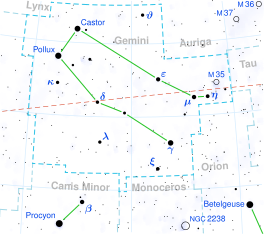Alhena
 From Wikipedia (Af) - Reading time: 3 min
From Wikipedia (Af) - Reading time: 3 min
| Alhena
| ||||

| ||||
| Alhena se ligging (in die rooi sirkel). | ||||
| Sterrebeeld | Tweeling | |||
| Bayer-naam | Gamma Geminorum | |||
| Spektraaltipe | A1.5 IV+ | |||
| Soort | Subreus, dubbelster | |||
| Waarnemingsdata (Epog J2000) | ||||
| Regte klimming | 06h 37m 42.71050s[1] | |||
| Deklinasie | +16° 23′ 57.4095″[1] | |||
| Skynmagnitude (m) | 1,915[2] | |||
| Absolute magnitude (M) | -0,68[3] | |||
| B-V-kleurindeks | +0,005[2] | |||
| U-B-kleurindeks | +0,137[2] | |||
| Besonderhede | ||||
| Massa (M☉) | 2,81[4] | |||
| Radius (R☉) | 3,3[5] | |||
| Ligsterkte (L☉) | 123[5] | |||
| Temperatuur (K) | 9 260[6] | |||
| Rotasiespoed (km/s) | 10,7±0,2[7] | |||
| Metaalinhoud [Fe/H] | -0,12[6] | |||
| Ander name | ||||
| Almeisan, 24 Geminorum, BD+16°1223, FK5 251, GCTP1539.00, HIP 31681, HD 47105, HR 2421, SAO 95912[1][8] | ||||
| ||||
Alhena (ook bekend as Gamma Geminorum of γ Gem) is die derde helderste ster van die sterrebeeld Tweeling. Met sy skynbare magnitude van 1,9[2] is dit een van die helderste sterre in die naglug en duidelik met die blote oog sigbaar. Volgens parallaksmetings is dit sowat 109 ligjare van die Son af.[1]
Eienskappe
[wysig | wysig bron]Alhena is ’n evoluerende ster wat al amper die waterstof in sy kern opgebruik en die subreusefase binnegegaan het. Sy sterreklassifikasie is A0 IV.[9] Sy massa is 2,8 keer dié van die Son[4] en sy radius 3,3 keer die Son s’n.[5] Sy ligsterkte is sowat 123 keer dié van die Son,[5] met sy effektiewe temperatuur van 9 260 K[6] wat dit die tipiese wit kleur van ’n A-tipe ster gee.[10]
Alhena is ’n spektroskopiese dubbelster met ’n periode van 12,6 jaar (4 614,51 dae) in ’n hoogs eksentrieke wentelbaan.[11]
Name
[wysig | wysig bron]Die ster se Bayer-naam is "Gamma Geminorum". Sy tradisionele naam "Alhena" kom van die Arabiese الهنعة Al Han'ah, "die brandmerk" (aan die nek van die kameel). Die alternatiewe naam, "Almeisan", kom van die Arabiese المیسان Al Maisan, "die helder een". In 2016 het die Internasionale Astronomiese Unie se sternaamwerkgroep (WGSN) die naam "Alhena" vir dié ster goedgekeur.[12]
Verwysings
[wysig | wysig bron]- ↑ 1,0 1,1 1,2 1,3 van Leeuwen, F. (November 2007), "Validation of the new Hipparcos reduction", Astronomy and Astrophysics 474 (2): 653–664, doi:10.1051/0004-6361:20078357, Bibcode: 2007A&A...474..653V
- ↑ 2,0 2,1 2,2 2,3 Gutierrez-Moreno, Adelina et al. (1966), "A System of photometric standards", Publ. Dept. Astron. Univ. Chile (Publicaciones Universidad de Chile, Department de Astronomy) 1: 1–17, Bibcode: 1966PDAUC...1....1G
- ↑ Anderson, E.; Francis, Ch. (2012), "XHIP: An extended hipparcos compilation", Astronomy Letters 38 (5): 331, doi:10.1134/S1063773712050015, Bibcode: 2012AstL...38..331A.
- ↑ 4,0 4,1 Shaya, Ed J.; Olling, Rob P. (Januarie 2011), "Very Wide Binaries and Other Comoving Stellar Companions: A Bayesian Analysis of the Hipparcos Catalogue", The Astrophysical Journal Supplement 192 (1): 2, doi:10.1088/0067-0049/192/1/2, Bibcode: 2011ApJS..192....2S
- ↑ 5,0 5,1 5,2 5,3 Malagnini, M. L.; Morossi, C. (November 1990), "Accurate absolute luminosities, effective temperatures, radii, masses and surface gravities for a selected sample of field stars", Astronomy and Astrophysics Supplement Series 85 (3): 1015–1019, Bibcode: 1990A&AS...85.1015M
- ↑ 6,0 6,1 6,2 Adelman, Saul J.; Philip, A. G. Davis (Desember 1994), "Elemental abundances of the B and A stars. 2: Gamma Geminorum, HD 60825, 7 Sextantis, HR 4817, and HR 5780", Publications of the Astronomical Society of the Pacific 106 (706): 1239–1247, doi:10.1086/133501, Bibcode: 1994PASP..106.1239A
- ↑ Gray, David F. (April 2014), "Precise Rotation Rates for Five Slowly Rotating a Stars", The Astronomical Journal 147 (4): 13, doi:10.1088/0004-6256/147/4/81, 81, Bibcode: 2014AJ....147...81G
- ↑ "ALHENA -- Spectroscopic binary", SIMBAD (Centre de Données astronomiques de Strasbourg), http://simbad.u-strasbg.fr/simbad/sim-id?Ident=Gamma+Geminorum, besoek op 2012-02-04
- ↑ Cowley, A. et al. (April 1969), "A study of the bright A stars. I. A catalogue of spectral classifications", Astronomical Journal 74: 375–406, doi:10.1086/110819, Bibcode: 1969AJ.....74..375C
- ↑ "The Colour of Stars", Australia Telescope, Outreach and Education (Commonwealth Scientific and Industrial Research Organisation), 21 Desember 2004, archived from the original on 2012-03-10, https://www.webcitation.org/6630AbtJZ?url=http://outreach.atnf.csiro.au/education/senior/astrophysics/photometry_colour.html, besoek op 2012-01-16
- ↑ Lehmann, H. et al. (Februarie 2002), "The spectroscopic binaries 21 Her and gamma Gem", Astronomy and Astrophysics 383 (2): 558–567, doi:10.1051/0004-6361:20011746, Bibcode: 2002A&A...383..558L
- ↑ "Bulletin of the IAU Working Group on Star Names, No. 1" (PDF). Besoek op 28 Julie 2016.
Eksterne skakels
[wysig | wysig bron] Hierdie artikel is vertaal uit die Engelse Wikipedia
Hierdie artikel is vertaal uit die Engelse Wikipedia
 KSF
KSF